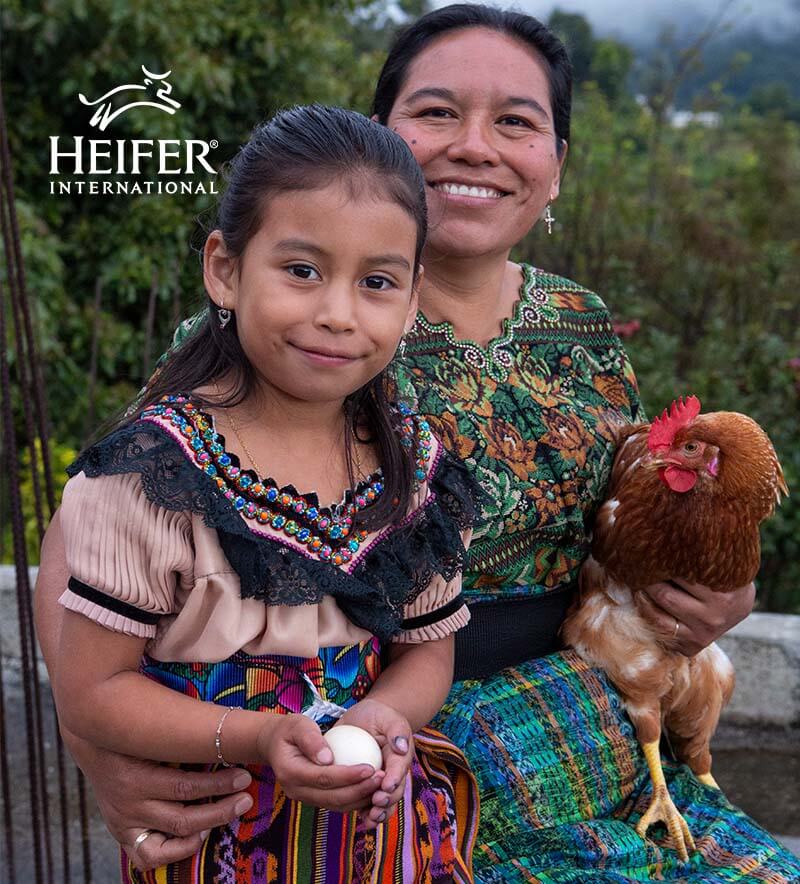Living Gifts: Heifer International

Project Information
Ending hunger and poverty while caring for the Earth.
Describe the need affecting community
Over 800 million people in the world are at risk from life-threatening hunger – 49 million people in 43 countries are at risk of falling into severe food insecurity today. Globally, almost one in 10 goes to bed hungry every night, and many of these are children. Globally, 3 billion people can’t afford a healthy, nutritious diet on a regular basis.
Poverty, conflict and the climate crisis are affecting the capacity of communities to put life-giving food on their tables every day.
According to the UN Hunger Report, hunger is the term used to define periods when populations are experiencing severe food insecurity. This happens when a person cannot guarantee a steady, daily supply of safe and nutritious food to live an active and healthy life.
There are many reasons why people experience hunger. Poverty is often a major cause of food insecurity. Conflict and violence can stop people getting the food they need while climate change and natural disasters can also reduce people’s food supply.
Since 1944, with the UMC’s help, Heifer International has supported nearly 43 million families. We are supporting them as they build food and farming businesses that put them on a pathway to a sustainable living income while also strengthening rural economies and caring for the Earth. We work with local farmers and food producers because we believe ending poverty begins with agriculture.
How will this Advance project help to address the need?
Our focus is still agricultural – we believe that the key to ending hunger is through transformative agriculture. Project participants are predominately women and are the recipients of asset transfers of animals. These assets (cows, chickens or goats) improve family nutrition and reduce food insecurity with readily available milk, meat or eggs.
Their animals increase family income as farmers sell excess agricultural products. As women are ready to turn farm production into a business, they can access credit through self-help groups and cooperatives, and with interest rates far below market averages. For many women, this is their first access to credit. Self-help groups train members how to outline goals for their individual growth. Members also train to assess their plans regularly, enabling them to modify the plans as they achieve objectives, while planning for future achievements.
Describe the primary goal of the project
Our goal is to lift 10 million additional families out of poverty and into sustainable living incomes by 2030. We are aligned with the United Nations Sustainable Development goals – and our efforts with your help will provide nutritious food, shelter, clean water, access to education for families in Africa, Asia and Central America.
Our framework centers around the following 4 ideas:
- Extremely poor, rural and smallholder farmers in marginalized communities achieve living incomes, and lead dignified, self-reliant lives;
- Rural smallholder farmers and their communities have access to inclusive markets and develop the capacity to benefit financially from participation in the economy;
- Social Capital – which generally refers to institutions, relationships and norms that shape the quality and quantity of a society’s social interactions – is strengthened through Heifer International’s Values-Based Holistic Community Development model;
- Smallholder farmers use sustainable, climate-smart practices that benefit farmer livelihoods and have a positive environmental impact.
Describe the change you would like to see in the community as a result of this Advance project
Through Heifer International’s programming, farmers gain access to the full range of credit, banking and financial services they need to fully develop their assets, land and business. Working with groups and cooperatives enables female farmers to grow into leaders.
Fundamental to success, project participants take part in Passing on the Gift (POG), by providing their animals’ offspring to other members of the community, along with the training they have received, ensuring that a Heifer project creates an ever-widening network of hope, dignity and self-reliance. This process transforms recipients into donors and, at minimum, doubles the impact of initial investments in Heifer projects.
Contact Information
Berit Kimrey
501.907.2970
bkimrey@heifer.org

